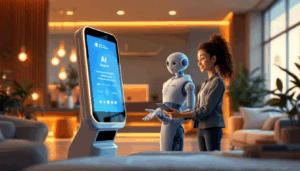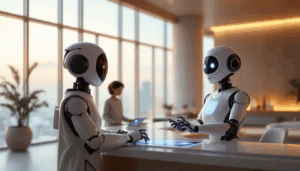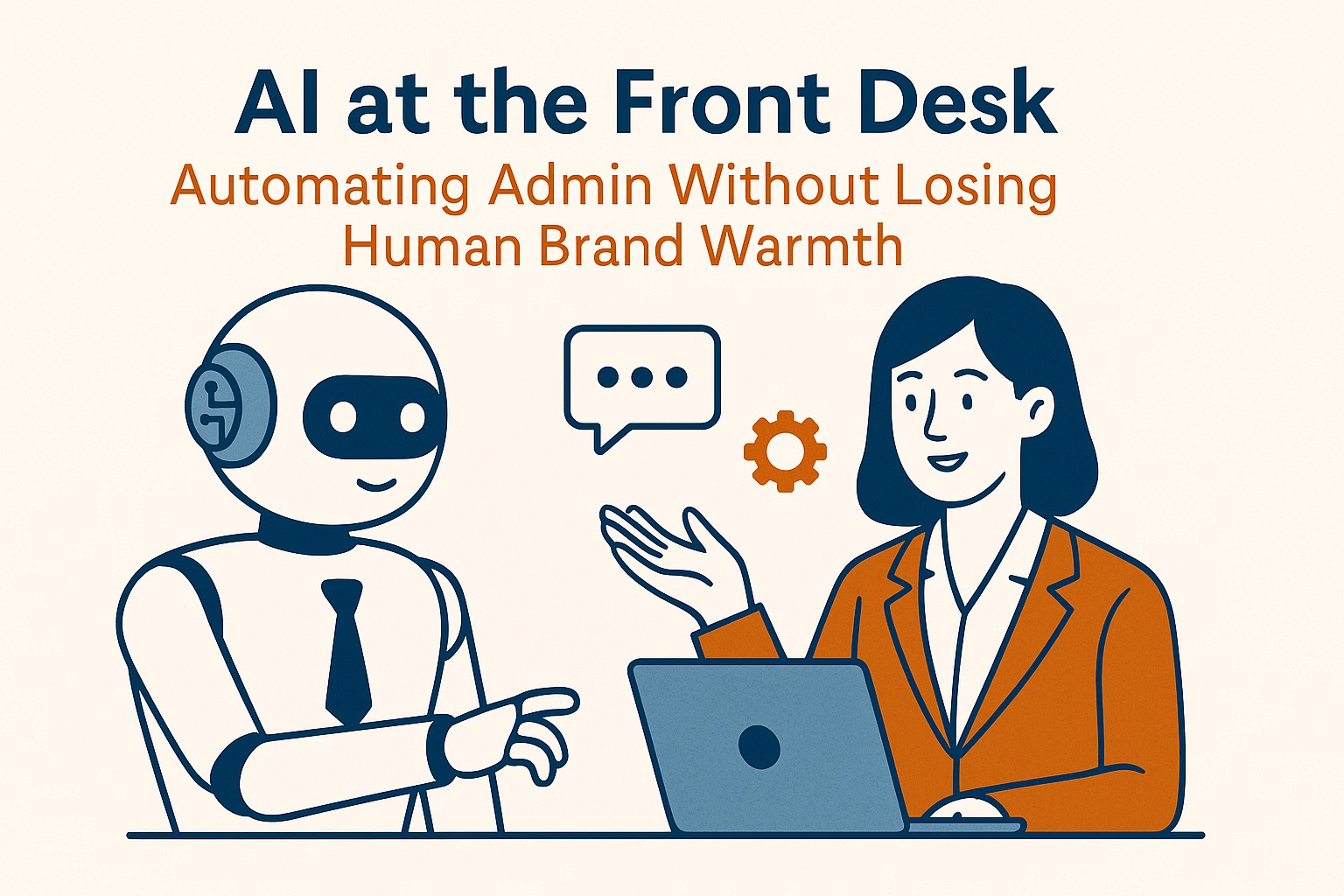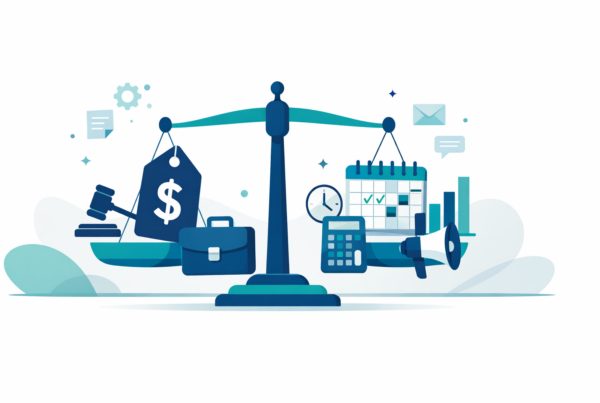AI at the Front Desk: Automating Admin Without Losing Human Brand Warmth
Using AI at the front desk, automating admin without losing human brand warmth can streamline administrative tasks like scheduling and managing inquiries. But how do you keep the warmth of human interaction intact? This article delves into strategies for balancing AI efficiency with maintaining your brand’s human touch, ensuring that technology enhances rather than replaces personal connections.
Curious how to strike that perfect balance between tech and human touch in your business? Let’s talk strategy – book your free 15-minute consult here.
Key Takeaways
- AI is transforming front desk operations by automating routine tasks, enhancing efficiency, and allowing human staff to focus on complex customer interactions.
- The integration of AI with human agents creates a balanced service model that improves customer satisfaction through personalized support and responsiveness.
- Ongoing training and support for staff are essential to maximize AI-human collaboration, ensuring effective use of technology while maintaining essential human empathy in customer service.
The Role of AI in Modern Front Desk Operations

AI is revolutionizing front desk operations, enhancing customer service and efficiency by automating tasks like scheduling appointments, managing emails, and answering repetitive questions. AI receptionists handle calls, schedule appointments, and manage routine inquiries quickly and accurately, allowing human staff to focus on more complex tasks in call centers.
This shift lets staff concentrate on tasks needing human judgment and empathy, boosting job satisfaction and productivity. AI handling mundane tasks allows staff to create meaningful customer interactions and solve intricate problems. This balance between AI efficiency and human touch is crucial for maintaining a high level of customer satisfaction.
AI enhances operational flexibility, allowing for efficient scaling. AI systems quickly handle time-consuming tasks like data entry and appointment management. This flexibility not only improves operational efficiency but also ensures that businesses can adapt to changing customer needs and market conditions, leveraging their AI capabilities.
Leveraging AI technology allows front desk operations to blend speed, accuracy, and personal touch seamlessly. The future of front desk services lies in the seamless collaboration between AI agents and human staff, ensuring that businesses can leverage AI to provide exceptional customer experiences around the clock.
Wondering how AI could streamline your team’s workload without losing your personal touch? Book a quick call and I’ll walk you through it.
Enhancing Customer Experience with AI-Powered Tools

AI-powered tools revolutionize customer experience with:
- Faster, more personalized service
- 24/7 availability, addressing customer queries even outside regular business hours
- Continuous support that ensures customer needs are met promptly, enhancing trust and satisfaction.
AI systems provide personalized service by understanding customer preferences and needs. For example, AI-powered chatbots can respond to inquiries in real-time, providing tailored assistance based on historical data. This level of personalization makes customers feel valued and understood, leading to better customer satisfaction and loyalty.
AI enhances customer interactions with quick, accurate responses, significantly reducing wait times. Natural Language Processing (NLP) ensures that AI can understand and respond to customer queries effectively, enhancing the overall customer experience. Embracing AI technology allows businesses to offer a nuanced customer experience that combines efficiency with a personal touch.
It’s not just about speed—it’s about connection. Want help designing your own high-tech, high-touch customer experience? Let’s chat.
Balancing Automation with Human Interaction

Although automation has many benefits, maintaining the human element is crucial for building customer relationships. Human warmth is key to establishing trust, especially in complex or sensitive situations. Companies should ensure that human agents are available to handle such scenarios, providing the necessary empathy and understanding.
Combining automation and human interaction can significantly improve customer experience. Automated systems can efficiently manage routine customer inquiries, allowing human agents to concentrate on issues that require personal attention. This balancing technology makes customers feel valued and understood, fostering patient satisfaction and loyalty.
Using customer data to customize automated responses enhances the personal aspect of personal interactions. Integrating AI with human services allows businesses to provide fast responses while maintaining a personal touch. Future AI innovations will likely enhance empathetic interactions through advanced technologies and personalization.
AI isn’t here to replace humans—it’s here to help them shine. Book a call to explore how your business can thrive with this approach.
Streamlining Routine Tasks for Operational Efficiency
AI’s ability to automate routine tasks revolutionizes operational efficiency. AI can handle up to 97% of routine inquiries, significantly reducing the administrative burden on staff. This allows human staff to focus on more complex tasks that require creativity and problem-solving skills, while also managing repetitive tasks.
AI can automate many tasks, including scheduling appointments, managing appointments, managing emails, and addressing routine questions. This automation improves efficiency and reduces the likelihood of human error. AI-driven systems can automatically send reminders for appointments, schedule appointments, automate routine tasks, reduce no-show rates, and ensure smooth scheduling.
AI tools can reduce operational costs and decrease workloads for human staff. In healthcare, AI receptionists manage pre-registration and self-check-in, minimizing waiting times and enhancing patient experience. Automating mundane tasks with AI allows businesses to operate more efficiently and effectively.
Ready to free your team from admin overload and unlock real growth? Let’s talk about your AI opportunities.
Real-Time Data Integration for Personalized Service
Real-time data integration is crucial for personalized customer service. AI scheduling systems seamlessly integrate with:
- CRM systems
- Calendars
- Payment gateways
- Communication platforms
This integration ensures access to up-to-date information and allows businesses to offer personalized interactions based on historical data, enhancing service quality and customer satisfaction.
AI receptionists can improve workflow by integrating with existing healthcare systems, streamlining operations, and ensuring customer interactions are based on current information. Leveraging real-time data allows businesses to provide an AI receptionist personal connection, making customers feel valued and understood in their patient care.
Reducing Human Error and Enhancing Accuracy
A major advantage of AI is its ability to minimize human error and enhance accuracy in front desk operations. AI offers real-time, context-aware support, ensuring that tasks are completed accurately and efficiently. This reliability is essential for maintaining high standards of customer service.
However, it’s essential to acknowledge that AI is not infallible. Potential errors, such as double-booking or failing to recognize specific customer needs, can occur. Combining AI’s precision with human oversight ensures any mistakes are quickly identified and rectified, helping to reduce human error and maintain high service quality.
Case Studies: Successful AI Integration in Front Desk Operations

Real-world examples offer valuable insights into successful AI integration in front desk operations. For instance, the Hilton Hotel uses a robot concierge named Connie, powered by IBM’s Watson, to answer guest inquiries and provide local tourism information. This AI-driven service enhances the guest experience by offering quick and accurate responses.
The Aloft Hotel has incorporated AI through smart technologies, allowing guests to customize their room environment and receive personalized recommendations via voice assistants. This AI integration enhances guest satisfaction by providing a seamless and personalized experience in the hotel industry.
The Crowne Plaza in San Jose uses a robot named Dash to deliver amenities to guest rooms based on requests autonomously. This service improves operational efficiency and adds a unique touch to the guest experience throughout the guest journey.
Marriott Bonvoy has implemented AI to enable customers to search for accommodations using natural language, making the booking process more intuitive and user-friendly.
These examples show how AI integration can enhance guest experiences and operational efficiencies across various major hotel brands. Leveraging AI technology allows businesses to offer superior service while maintaining the warmth of human interaction.
Imagine what your front desk could look like with the right AI support. Let’s explore the possibilities together.
Human-AI Collaboration for Better Customer Satisfaction
Combining AI’s efficiency with human empathy leads to improved customer experience and satisfaction. AI and human receptionists together create a balanced and efficient front desk, ensuring that customers receive both accurate information and personal attention.
By taking over mundane tasks, AI allows human agents to engage in more complex problem-solving and customer interactions. This collaboration lets human staff focus on providing higher-quality customer service, enhancing overall satisfaction.
AI’s quick data processing allows human staff to concentrate on intricate tasks that require emotional intelligence and creativity. Customers prefer businesses that offer real human interaction alongside AI services, making human-AI collaboration essential for maintaining high customer service standards.
Training and Support for AI-Human Interaction
Effective training and support are crucial for successful AI-human interaction. Human staff and desk staff must be familiar with AI tools and understand their benefits in front desk operations. As decision-making capabilities advance, traditional customer service training methods become inadequate.
Ongoing training is necessary as AI integration creates new job roles demanding specialized skills and knowledge. Regular staff feedback is essential for improving the integration of technology and personal interaction.
Creating a culture of continuous learning helps businesses quickly adapt to technological advancements and ensure effective human-AI collaboration.
Looking to build a culture that thrives alongside AI? Book a call and I’ll share how to set your team up for success.
Addressing Concerns About AI Replacing Human Jobs
Fear of AI replacing human jobs is a common concern. However, AI handles routine tasks, enabling receptionists to build relationships and provide a personal touch. Human workers can focus on urgent or complex needs requiring empathy and problem-solving.
AI offers many benefits, but cannot replicate the emotional intelligence and personal touch of human workers. By showing how artificial intelligence can enhance rather than replace agent capabilities, businesses can implement AI to mitigate fears of job displacement and demonstrate that AI can lead to more meaningful and satisfying work.
Future Trends in AI-Enhanced Front Desk Services

The future of AI-enhanced front desk services in the hospitality industry is promising, with AI systems becoming more intuitive and capable of understanding nuanced conversations. Generative AI in the tourism market is projected to grow faster than overall AI growth, indicating a trend towards more advanced AI applications.
As AI technology evolves, further innovations will enhance guest interaction, reduce wait times, and provide more personalized services. Embracing AI allows businesses to stay ahead of the curve and continue offering exceptional customer experiences while maintaining the warmth of human interaction.
Summary
In summary, integrating AI into front desk operations offers numerous benefits, including enhanced customer experience, improved operational efficiency, and reduced human error. By automating routine tasks, AI allows human staff to focus on more complex and meaningful work, leading to better customer satisfaction.
The key to successful AI integration lies in balancing automation with human interaction, providing personalized service, and ensuring continuous training and support. As we look to the future, embracing AI while maintaining the warmth of human interaction will be essential for businesses to thrive.
The future of service is human-AI synergy. Are you ready to lead it? Let’s connect and map your next move.
Frequently Asked Questions
How does AI improve customer experience at the front desk?
AI enhances customer experience at the front desk by ensuring 24/7 availability, delivering personalized services tailored to individual preferences, and minimizing wait times through efficient and precise responses.
Can AI completely replace human staff at the front desk?
AI cannot completely replace human staff at the front desk, as it cannot handle complex problem-solving and provide the personal touch that only humans can offer. Thus, a balance of both is necessary for optimal service.
What are some successful examples of AI integration in front desk operations?
Successful examples of AI integration in front desk operations include Hilton Hotel’s robot concierge Connie, Aloft Hotel’s smart technology for personalized recommendations, and Crowne Plaza’s robot Dash for delivering amenities. These innovations enhance efficiency and guest experience significantly.
How does AI reduce human error in front desk operations?
AI minimizes human error in front desk operations by automating tasks like appointment scheduling and data entry, thereby ensuring greater accuracy and reliability. This support leads to more efficient and consistent operations.
What future trends can we expect in AI-enhanced front desk services?
We can expect AI-enhanced front desk services to feature more intuitive systems that understand nuanced conversations, alongside the growth of generative AI to improve guest interactions and personalization. These advancements will significantly elevate the overall guest experience in the tourism industry.



